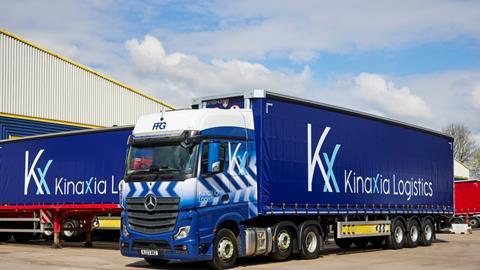Kinaxia Limited plunged into the red in 2023, delivering a pre-tax loss of £21.2m during the year, which the group attributed to falling demand for transport and warehousing services, thanks to the UK’s “challenging trading environment”, high interest rates and rising inflation.
The group, which has its headquarters in Macclesfield, consists of 12 subsidiaries, including Bay Freight; William Kirk; NC Cammack; Lambert Brothers Haulage; Foulgers Transport; Panic Transport (Contracts); AJ Maiden; Mark Thompson Transport; AKW; Fresh Freight; David Hathaway Transport; and Kinaxia Logistics and Fulfilment.
According to its latest annual results, which were delivered a month late, group turnover fell to £189.2m in the year to 31 December 2023 compared to turnover of £206.1m in 2022, whilst pre-tax losses amounted to £21.2m during the year, down from a pre-tax profit of £1.8m in 2022.
In its strategic report to the results the group said the results were “disappointing” and pointed to “high inflationary pressures within the UK economy” as another key factor in its performance, which it said hit its gross margins, despite attempts to reduce costs and to pass some cost increases onto customers.
The report added: “As a result of these adverse trading performances in the year, during the annual impairment appraisal review, three companies within the group underwent an impairment of the goodwill held on the balance sheet for these entities.
“As a result, impairment losses were recognized in Foulgers Transport, Lambert Brothers Haulage and David Hathaway Transport” which the report revealed amounted to £4.3m, £1.7m, and £5m respectively.
During the year, the business also incurred “significant increases” in its interest charges as a result of underlying increases in interest rates, particularly the SONIA rate used as a basis for the company’s previous £41.5m term loan facility, with the group incurring a total interest expense of £14m compared to £11.4m in the previous year.
According to the annual results of Kinaxia’s subsidiaries, which were published shortly before Kinaxia’s results, nine of Kinaxia’s 12 subsidiaries fell into the red in 2023, another two saw their pre-tax profits tumble and only one - NC Cammack - managed to boost its profit.
Despite the scale of the group’s losses, the directors remain upbeat, according to the strategic report, thanks to the recent change of ownership and a financial restructuring in December 2024.
This saw the group repay the entire £41.5m term loan facility agreement with majority shareholder and US citizen David Shaw, and secure a new term loan of £39m with a fixed interest rate of 8% and a repayment date of June 2027.
The deal also included the transfer of a 90% equity share in the group, with ownership transferred from Peter Fields and Graham Norfolk to DELALV Delaware, a holding company registered in Delaware in the US.
The strategic report states: “This successful restructuring provides the group with short to medium term financial stability, enabling it to focus on delivering its strategic objectives.”
The restructuring also saw a management overhaul, with Gareth Jenkins replacing Graham Norfolk, who had been a director with the company since 2015 and Allan Blakeley appointed COO. Kinaxia said he had more than 30 years’ experience in UK and European logistics and e-commerce fulfilment.
In addition, Simon Nelson was promoted from COO to the new post of MD of contract logistics, with a brief to develop and expand Kinaxia’s key customer base and contract logistics services.
Looking to the future, the strategic report to the results added: “Management has completed a budgeting process for the three years ending 31st December, 2027 incorporating a detailed income statement in cash flow analysis.
“The trading performance to the end of October 2024, for the year ending 31st December, 2024, has continued to have been disappointing, with the group trading behind its three year plan, as the group continues to battle the headwinds and cost pressures in the current UK economy and manages to reduce its warehousing capacities to align with customer demand.
“To mitigate against the risks of economic downturn and inflation, the business intends to repeat its annual price increases to customers in future, as well as continuing to closely monitor and manage costs.”
It added: “The directors have assessed the funding requirements of the group and the company and compared them to the banking facilities and arrangements available following the restructuring process and are satisfied the group will be able to meet its liabilities as they fall due.”

















